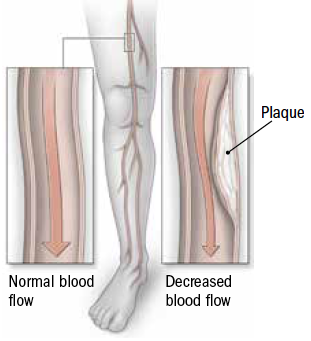Recent Articles

Foot pain: A look at why your feet might hurt

Matcha: A look at possible health benefits

Wildfires: How to cope when smoke affects air quality and health

Forearm workouts: Strengthening grip for everyday function

Depression symptoms: Recognizing common and lesser-known symptoms

Medication side effects: What are your options?

Independent living with home care assistance: Balancing autonomy and support

Dialysis: What to expect from this life-changing — and lifesaving — treatment

The BEEP program: Keep your balance

Hoarding: What to know about this mental health disorder
Medications Archive
Articles
Heart attacks: Less frequent and less deadly than 20 years ago
Research we're watching
Fewer older adults are having heart attacks, and more are surviving them, according to a study published March 15 in JAMA Network Open.
Researchers analyzed data from more than 4.3 million people ages 65 and older who had suffered heart attacks over a 20-year period beginning in 1995. Back then, 20% of those included in the study died from their heart attacks. By 2014, that number had fallen to 12%.
A leg up on peripheral artery disease
The condition causes leg pain and fatigue that make activity difficult, but lifestyle changes can improve how you feel.
The occasional leg pain or stiffness is often not cause for concern, but if pain or fatigue develops after just a few minutes of walking or climbing stairs, it could be an early sign of peripheral artery disease (PAD).
"PAD not only interferes with an active lifestyle, but also can put you at higher risk for a heart attack and stroke," says Dr. Michael Belkin, chief of the Division of Vascular and Endovascular Surgery with Harvard-affiliated Brigham and Women's Hospital. "You can't cure PAD once it occurs, so you want to take measures to avoid it as much as possible."
Look out for Lyme
Here's how to protect yourself from this growing tick-borne disease.
Summer is the ideal time to enjoy the outdoors, but while you're interacting with nature, you need to look out for ticks that carry Lyme disease, the most common tick-borne disease in the United States.
About 300,000 people are diagnosed with Lyme disease each year, according to the CDC, and new research suggests that number will rise by 20% by mid-century.
Is under-the-tongue allergy therapy safe and effective?
Ask the doctors
Q. I have seasonal allergies and I'm thinking about getting allergy shots to control them. But I hate shots and would prefer the sublingual treatments. Are these treatments considered equally safe and effective?
A. The short answer to your question is yes. Sublingual allergy treatments, which are small doses of allergens administered as tablets or liquid drops under the tongue, are considered safe and effective compared with allergy shots.
Healthy individuals don't need low-dose aspirin therapy
Research we're watching
If you're healthy and don't have a history of cardiovascular disease, daily low-dose aspirin is no longer recommended as a preventive measure, says a new guideline released by the American Heart Association and American College of Cardiology. The risks of internal bleeding and other side effects outweigh the benefits of aspirin in this group.
The new guideline, which was based on numerous recent studies, does not apply to people who have had a heart attack or stroke or who have undergone a bypass procedure. The recommendation to take low-dose aspirin therapy in this group is unchanged.
Undoing the harm: Tapering down from high-dose opioids
The CDC’s Guideline on Prescribing Opioids for Chronic Pain helps doctors and patients manage treatment at safe levels and avoid dependence. Any plan to taper medication dosage should be personalized to the patient’s needs.
What to do if your medication is recalled
Drug recalls don't necessarily affect every batch of a pill or potion. You'll need to do a little homework before you stop taking your medication.
We take prescription and over-the-counter medications to get better or avoid getting sick. We know drug side effects can make us feel ill. But we don't imagine that medications can contain toxic impurities. Yet, it happens. Recently, for example, dozens of prescription blood pressure pills (angiotensin-receptor blockers, or ARBs) containing trace amounts of potentially cancer-causing compounds were recalled.
Recalls happen frequently. Sometimes, the FDA finds the manufacturing process to be defective. Other times, a dangerous side effect that was initially not apparent becomes clear later. "Some medication recalls are for problems that are not very serious, but the products have to be recalled nonetheless," says Joanne Doyle Petrongolo, a pharmacist with Harvard-affiliated Massachusetts General Hospital.
Sex hormones and your heart
Here's the latest thinking about how estrogen or testosterone therapy may affect cardiovascular risk.
The two main sex hormones — estrogen and testosterone — have wide-ranging effects in the body. Produced primarily by the ovaries (estrogen) and testes (testosterone), these hormones affect not just your sexual function but also your bones, brain, and blood vessels, for example.
As people age, the natural decline in sex hormone levels sometimes causes undesirable symptoms, such as hot flashes or a flagging sex drive. Doctors can prescribe pills, patches, gels, and creams containing estrogen or testosterone to ease those symptoms. But are these products safe for your heart?
Lessons from the blood pressure drug recall
Here's what you need to know about the discovery of contaminants in a popular class of heart medications.
Last summer, a number of prescription medications containing the generic drug valsartan were recalled by manufacturers after investigators found trace amounts of possible cancer-causing impurities in some of the products. Over the following months, additional lots of valsartan, as well as batches of two similar drugs, losartan and irbesartan, were also pulled from pharmacy shelves.
All three of these drugs belong to a class of medications known as angiotensin-receptor blockers, or ARBs. These drugs block the effects of a hormone that narrows blood vessels and are used to treat high blood pressure and heart failure. The recalled products also include combination drugs that contain one of those three ARBs. (See "Medication recall information" for accessing the list of affected products.)
After hospitalization for heart disease: Avoid opioid drugs?
Research we're watching
People with heart disease who leave the hospital with a prescription for opioids may be more likely to miss follow-up care than those not prescribed opioids, a new study finds.
The study included nearly 2,500 people (mostly white men with an average age of 60) who were discharged from a university medical center after a heart attack or sudden heart failure. One in five were prescribed the powerful pain relievers known as opioids. Those people were less likely to follow up with their health care provider or to participate in cardiac rehabilitation than those not prescribed opioids.
Recent Articles

Foot pain: A look at why your feet might hurt

Matcha: A look at possible health benefits

Wildfires: How to cope when smoke affects air quality and health

Forearm workouts: Strengthening grip for everyday function

Depression symptoms: Recognizing common and lesser-known symptoms

Medication side effects: What are your options?

Independent living with home care assistance: Balancing autonomy and support

Dialysis: What to expect from this life-changing — and lifesaving — treatment

The BEEP program: Keep your balance

Hoarding: What to know about this mental health disorder
Free Healthbeat Signup
Get the latest in health news delivered to your inbox!
Sign Up











